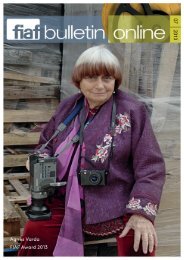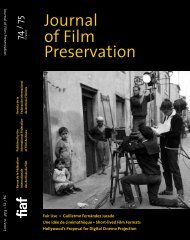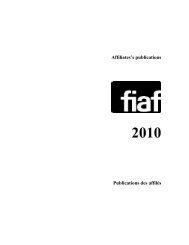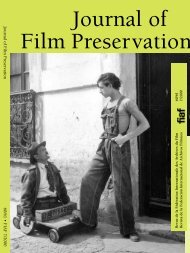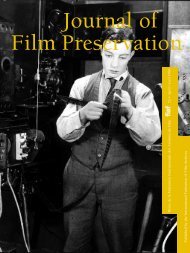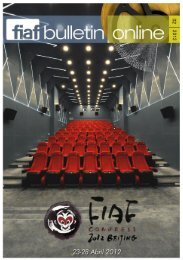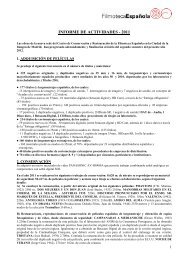Journal of Film Preservation - FIAF
Journal of Film Preservation - FIAF
Journal of Film Preservation - FIAF
Create successful ePaper yourself
Turn your PDF publications into a flip-book with our unique Google optimized e-Paper software.
idealism. But if Poirier portrayed Foucauld as impressed by the<br />
words <strong>of</strong> Jaurès, the future leader <strong>of</strong> French Socialists assassinated on<br />
the eve <strong>of</strong> World War I (“un bel orateur et un beau programme”), the<br />
earlier conversation with de Morès suggests a markedly different<br />
perspective. For the Marquis Antoine de Morès was, among other<br />
things, an outspoken anti-Semite and one-time ally <strong>of</strong> Edouard<br />
Drumont, author <strong>of</strong> the notorious 1886 anti-Semitic classic, “La<br />
France juive”. A syndicalist <strong>of</strong> sorts, de Morès organized the butchers<br />
<strong>of</strong> Paris. In an 1894 text titled “Le Secret des changes”, he advocated<br />
a fusion <strong>of</strong> the labor union movement and anti-Semitism under what<br />
he termed “la doctrine du faisceau.” As Jeffrey Mehlman has noted, it<br />
is one <strong>of</strong> the earliest references to what he - and others such as Zeev<br />
Sternhell - have referred to as a native French fascism.5<br />
Foucauld’s responsiveness to both Jaurès and Morès signaled the<br />
extent to which his growing dissatisfaction with the secular values<br />
represented by science and material innovation clashed with the call<br />
to silence and solitude that drew him to the desert and a spirituality<br />
removed from urban modernity. In this sense, it is not at all<br />
surprising that Poirier’s film received the endorsement <strong>of</strong> Field<br />
Marshall Hubert Lyautey, the great “pacifier <strong>of</strong> Morocco” and resident<br />
governor <strong>of</strong> the protectorate regime there between 1911 and 1925.<br />
L’Appel du silence was fully in line with Lyautey’s desire to reconcile<br />
Islamic and French cultures by bringing Islamic believers into the<br />
Christian fold in what amounted to pacification in the mode <strong>of</strong> a<br />
new Christian crusade. Poirier’s film biography <strong>of</strong> Foucauld<br />
embodied the conversion on a personal level from militant<br />
occupation to civilizing presence. Yet I see this conversion as<br />
retaining aspects <strong>of</strong> bellicose occupation under erasure in the guise <strong>of</strong><br />
an evangelical and pacifist mission. It is no wonder that Lyautey<br />
found Poirier’s film timely and important (Hayward, 150).<br />
Another element in Poirier’s conflation <strong>of</strong> spiritual and nationalist<br />
values comes to the forefront midway through the film after<br />
Foucauld resigns his voluntary commission in the French colonial<br />
forces and prepares his year-long reconnaissance mission in Morocco.<br />
He recounts his projected itinerary to McCarthy, a European who<br />
runs a bookshop in Algiers and who shares Foucauld’s passion for<br />
the desert. The latter advises that Foucauld’s first concern should be<br />
for a disguise without which any stranger in Morocco would<br />
immediately be assassinated or kidnapped for ransom. When<br />
McCarthy lists the possible options as those <strong>of</strong> Arab or Jew, Foucauld<br />
answers without hesitating, “Je préfère les Arabes.”6 McCarthy points<br />
out that if Foucauld betrays any kind <strong>of</strong> Western accent or commits<br />
even the most minor infraction <strong>of</strong> Islamic practices, he will disclose<br />
his cover. McCarthy has another suggestion: “As a Jew, on the<br />
contrary, you can speak a mishmash (un sabir) <strong>of</strong> many languages.<br />
Besides, Jews are so despised in Morocco that no one will pay<br />
attention to you. This way you could also find shelter in synagogues”<br />
(Poirier, 127). And so the future Christian hermit <strong>of</strong> Tamanrasset and<br />
45 <strong>Journal</strong> <strong>of</strong> <strong>Film</strong> <strong>Preservation</strong> / 63 / 2001<br />
El artículo aborda L’Appel du silence<br />
(1936), película de ficción de Léon Poirier, a<br />
la luz del estudio del cine colonial del<br />
período de entre-guerras. Estudia a Poirier<br />
en relación con su uso de los decorados<br />
naturales, su concepción del documental y<br />
los temas históricos usuales en sus películas<br />
mudas de los años 20. El análisis de L’Appel<br />
du silence se concentra sobre los elementos<br />
de exotismo, militarismo y antisemitismo<br />
contenidos en la narración de la vida del<br />
Padre Foucauld, aristócrata francés que<br />
deja su carrera de <strong>of</strong>icial castrense por<br />
seguir el llamado lleno de misticismo del<br />
desierto de Argelia. Este llamado confronta<br />
al padre Foucauld con los valores<br />
modernizantes del comienzo del Siglo en<br />
Francia.



